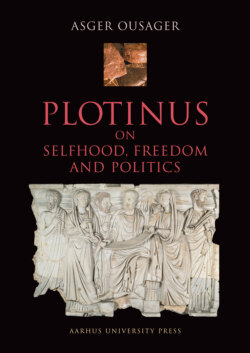Plotinus

Реклама. ООО «ЛитРес», ИНН: 7719571260.
Оглавление
Asger Ousager. Plotinus
Introduction. Selfhood
Freedom
Politics
PART I
SELFHOOD
CHAPTER I.A. Unification with Soul
CHAPTER I.B. Unification with Intellect
I.B.1. Memories of the body
I.B.2. Potentiality or actuality of Intellect?
I.B.2.a. Actualisation of Intellect
I.B.2.b. Actualisation of Forms
I.B.2.c. A failing criterion
I.B.3. Forms of particulars within Intellect
I.B.4. Intentionality within Intellect
I.B.5. The gaze of souls
I.B.6. In-esse and determinism
I.B.7. Is Intellect unified?
CHAPTER I.C. Unification with the One. I.C.1. Envisioning the One
I.C.2. The One within
I.C.3. Inferences from Proclus and Augustine
I.C.4. Annihilation or preservation?
I.C.4.a. Preservation of particularity
I.C.4.b. Annihilation of the particular self
I.C.5. Unity or plurality first?
PART II
FREEDOM. CHAPTER II.A. Sufficient reason behind causes
II.A.1. Reason and cause in Plato and Plotinus
II.A.2. Causa sui or ratio sui?
II.A.3. Plotinus interpreting the Euthyphro
II.A.4. Sufficient Providence
CHAPTER II.B. Distinguishable souls
CHAPTER II.C. Determinism disrupted. II.C.1. The causal nexus of ultimate unification
II.C.2. Absolute freedom attained
II.C.3. Two concepts of necessity
II.C.4. Determinism put into perspective
II.C.5. The absolute Self
II.C.6. Self-determination, self-causation and self-motion
II.C.7. Puppets, slaves or assistants?
PART III
POLITICS
CHAPTER III.A. Coming to imperial Rome
CHAPTER III.B. Political philosophy
III.B.1. The king
III.B.2. Inequality of worth
III.B.3. The general
III.B.4. The legislator
III.B.5. War
III.B.6. Power and wealth
III.B.7. The city-state
III.B.8. Homeland and empire
III.B.9. Dialogue, democracy and human rights
III.B.9.a. Gender, sex and love
III.B.10. Efforts of individuals
CHAPTER III.C. The “Plotinus sarcophagus”
III.C.1. The chair of Plotinus?
III.C.2. Emperor Gallienus in the chair?
III.C.3. The iconographic touch of Plotinianism
Conclusion
Literature. Ancient and medieval authors with translations* Poetry
Presocratic philosophy
Drama
Platonism
Aristotelianism
Pythagoreanism
Stoicism
Epicureanism
Natural science
Declamation
Judaic theology
Christian theology
Manichaean theology
Astrology
History of philosophy
General history
Atlas and dictionaries
Modern authors
Index of passages. Alexander of Aphrodisias
Ammianus Marcellinus
Anaxagoras
Anaximander
Anonymous (Neopythagorean)
Anonymous (Platonist)
Anonymous (senator)
Anselm
Apuleius
Aristotle
Arrian
Athanasius
Augustine
Aurelius Victor
Cassius Dio
Cicero
Dio Chrysostom
Diogenes Laertius
Empedocles
Epictetus
Epicurus
Eunapius
Euripides
Eutropius
Firmicus Maternus
Fragments of ancient Stoics
Giovanni Dominici
Greek commentaries on Aristotle
Heraclitus
Herodotus
Hesiod
Hippolytus
Homer
Johannes Zonaras
John Stobaeus
Julian the Apostate
Latin inscriptions (CIL)
Mani
New Testament
Numenius
Old Testament
Orosius
Parmenides
Philo
Philostratus
Plato
Plotinus
Plutarch
Porphyry
Proclus
Pseudo-Aelius Aristides
Seneca
Sibyl
Simonides
Sophocles
Suetonius
Tertullian
Thomas Aquinas
Virgil
Writers of Augustan History
Xenophon
Zosimus
General index
Noter
Отрывок из книги
ASGER OUSAGER
ON SELFHOOD, FREEDOM AND POLITICS
.....
Given that human souls have their origin directly in the One, what, then, distinguishes them from each other? There has to be a sufficient reason for the distinction. The One itself is not only the ultimate cause (aition) of everything, but also the ultimate reason (aitia) for everything including itself, according to Plotinus’ interpretation of Plato, which he formulates as a response to the problem surrounding the relation between arbitrary will and modal necessity in the Euthyphro. I argue that Hadot’s thesis of the One in Plotinus as a cause of itself (causa sui) on the other hand, is unwarranted.
Providence is the name of the sufficient reason that governs everything flown from the One towards the best, i.e. towards unification. In order to avoid indistinctness with the resulting identity of human souls in only one human soul, it would be necessary for the preference (proairesis) of each soul to be different from that of any other soul from the very beginning. Consequently, the series of resulting choices and dispositions of souls will be quite different from each other. The series and the decisive beginning of the series are contained within the Form of the particular soul. Providence also determines which human souls will ascend to ultimate unification with the One. Human unification with the necessary determinant, namely the One as “absolute freedom”, must have indeterministic causal consequences for the whole causal hierarchy. In particular, such indeterministic causal consequences will follow for the human soul attaining ultimate unification, as the determinism of Providence again determining the Form of the particular is disrupted by this intervention. This Form will, however, be recreated and adjusted to the new state of affairs generated from ultimate freedom, as the human soul must descend again. Here, Plotinus is probably giving what he believed to be the Platonic answer to the problem surrounding the relation between self-determination and determinism discussed by the Stoics and Alexander of Aphrodisias – a discussion most recently scrutinised by Susanne Bobzien. Plotinus denies self-determination of the One and consequently the One as a causa sui because this premise would restrict the One’s absolute measure of freedom. Instead he affirms human self-determination as derived from that absolute freedom.
.....